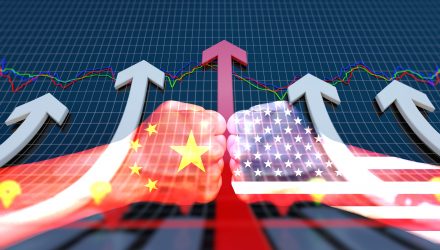Last month, U.S. President Donald Trump announced his administration was moving forward with imposing a 10% tariff on $200 billion worth of Chinese goods that includes a step-up increase to 25% by the end of the year. The administration moved forward with the tariffs despite both economic superpowers in the midst of scheduled trade talks to ease tariff tensions.
In less than 24 hours, China responded with $60 billion worth of tariffs on U.S. goods beginning on Sept. 24. The new round of tariffs from China are said to affect a list of 5,207 products within a range of 5 to 10% as both the U.S. and China have already slapped each other with tariffs worth $50 billion total.
Trade Wars Not Affecting U.S. Yet
Just recently, the Federal Reserve hiked the federal funds rate by 25 basis points as a result of a strong U.S. economy, but market analysts are prognosticating that an escalation in the trade wars could give pause to the Fed’s current rate-hiking policies moving forward as they could potentially stymie economic growth. However, despite the growing concerns of trade wars, Fed Chairman Jerome Powell said its wide-ranging effects have yet to penetrate the economy and cause any disruptions.
“I think if you look at the aggregate performance of the U.S. economy, it’s hard to see much happening at this point,” said Powell. “You can look at it the other way and ask ‘If all the tariffs that have been announced are applied, what would be the affect at the aggregate level?’ They’re still relatively small.”
Powell did mention that loss of business confidence that could reduce investor capital and also the long-term effect on the financial markets are reasons that could bring trade wars under heavier scrutiny by the Federal Reserve. While Powell was quick to dismiss any short-term effects the tariffs have had thus far, he did mention that its long-term effects are cause for concern.
“More than anything, I would worry in the longer run where this is going,” said Powell. “If the end place we get to is lower tariffs, then that would be good–trade generally supports productivity and higher incomes.”
“If this inadvertently goes to a place where we have widespread tariffs for a long time in a more protectionist world, that’s going to be bad for the United States economy.”
Compounding the U.S. China trade wars is that no resolution appears to be in sight as a Bloomberg report revealed that talks were less than cordial between Secretary of State Michael Pompeo and Chinese officials during a meeting in Beijing.
For more market trends, visit ETF Trends.
